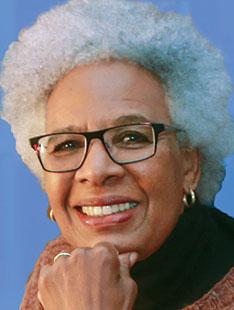

Once I got over my fear of speaking in her presence, I found her to be one of the sharpest people I'd ever engaged. I thought it was the aura of a person in full awareness of their big brain and all that it could do.

There was something modest and grand about how she carried herself. Years after Howard, I sat with Painter on a panel at the United Nations. And if these black people truly were human, than it meant that other people likely would also do the same. The history I had been taught had been crafted by humans for political aims. I thought about that for awhile-history and humanity. The Nubians, for whom I was named, weren't going to cut it. I have often referred to my history professors destroying all my Afrocentric fantasies, and then telling me that I must, somehow, pick up the pieces and argue for my humanity. I also came to understand at Howard that historians are heartbreakers. By then I understood her to be one of th e great historians of our era. I certainly knew about her during by my late teenage years at Howard. My Dad had a ridiculous collection of black books and I'd just swim through them.


I probably first came across Painter as a young child. It seemed logical, to me, that this progress would end-some day-with the complete vanquishing of white supremacy. I believed that you could sketch a narrative of progress in this country from enslavement to civil rights. At that point I was a progressive in every sense of the word. It didn't really mesh with my worldview at the time. You can see from my posting at the time I was sort of horrified by Painter's argument. So on the upper strata, among these few people up here who are doing very well there will be people of various colors and from various backgrounds, but they will probably not be so racialized as the people who are not doing well. This group of people who are scraping by, there will be a lot of them, but they will probably be largely black and brown and that will tend to reinforce racial ideas. We have a great inequality of wealth and income. On the other hand, the idea of blackness, that is poor dark-skinned people, I think we will have that with us always, and when we particularly at this moment of economic crisis and this moment in which we have a small number of very rich people and a lot of people who are kind of scraping by and then tremendous differences.


 0 kommentar(er)
0 kommentar(er)
